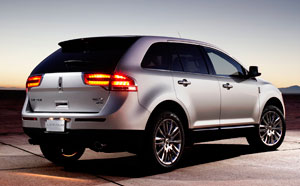
Ford CEO Alan Mulally likens the Lincoln marque’s restructuring to the process that revived the Blue Oval brand.
Lincoln is going through an “important transition,” Mulally says at the auto maker’s 56th annual shareholders’ meeting in Wilmington, DE.
“The plan is to right-size the Lincoln distribution network to increase throughput,” he says. “The second part of the plan is a new set of Lincoln products.”
Mulally says Ford’s management team is seeking feedback from Lincoln dealers on the future direction of the brand, including what the luxury lineup should look like.
“Dealers are pleased,” he says. “Over the next year as products come to market and the distribution network gets right-sized, we’re going to be successful. But it is a transition period.”
As of last October, Lincoln had about 500 dealers in those key markets, but Ward’s is told that number now is closer to 400. Lincoln stores total about 1,100.
To manage the process, Ford has implemented the Lincoln Commitment program. Currently in the first phase, it calls on dealers to offer loaner vehicles and free washes; conduct sales and service training; update signage and launch a certified used-vehicle program.
Dealers have access to a devoted website to measure and monitor their progress toward meeting the objectives.

On Sept. 1, Ford will actively measure dealers’ performance. Those who meet the criteria will receive financial support from the auto maker, although details as to what that entails were not disclosed.
“Everything were doing is in line with what other luxury brands expect,” says Lincoln spokesman Christian Bokich.
“Dealers are in a practice period between April 1 and Sept. 1, and they’re already giving feedback and making adjustments as needed.
“It’s a very collaborate process, and we’re certainly going into this with an open mind, not only to be competitive with luxury competitors, but exceed (the competition),” he adds.
During recent meetings with Lincoln dealers, details of Ford’s plans for the network were divulged. But specific product plans were not revealed, Bokich says.
Lincoln has announced it will introduce seven all-new or refreshed vehicles over the next five years, including the brand’s first C-segment vehicle.
Ford hopes its strategy will help reinvigorate the Lincoln brand, whose sales have been lackluster.
Through April, Lincoln’s U.S. sales were up a scant 0.6% to 7,236 units, according to Ward’s data. In comparison, total U.S. luxury segment sales were up 11.3% to 130,261.
Bokich declines comment on the size of Lincoln’s network, but concedes Ford is trimming. The auto maker is not – and cannot for legal reasons – force stores to close, “so we’re working with them,” he adds. “We have to align ourselves with our luxury competitors and customers. If you’re a dealer in a metro market (and) you’re not next to a luxury auto mall you might want to think twice.”
Some 130 U.S. markets account for 80% of the nation’s luxury auto sales.
Meanwhile, the Ford family comes out on the winning end of another call to strip them of their Class B shares. The proposal was rejected by 68.5% of more than 4.4 million shareholders.
The Ford family likely swayed the vote. Its 70 million shares of “Class B” shares translates to a 40% of all outstanding stock.
While these so-called “super shares” have been a hot-button issue at most shareholder meetings, the stock structure is not uncommon. Other companies with similar structures include Tyson, Cablevision, Hewlett Packard, Berkshire Hathaway, Viacom, and Hollinger International.
And according to the University of Southern Maine’s Institute for Family-Owned Business, some 35% of Fortune 500 companies are family-controlled, and various studies indicate such companies often outperform their traditionally structured counterparts.
Although many shareholders object to the Class B shares, others embrace it.
“One of the great strengths of a company like Ford is the long-term view, understanding and experience that comes with more than 100 years of involvement by the Ford family,” says shareholder Joe Baker from Southaven, MS.



